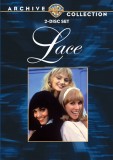| Reviews & Columns |
|
Reviews DVD TV on DVD Blu-ray 4K UHD International DVDs In Theaters Reviews by Studio Video Games Features Collector Series DVDs Easter Egg Database Interviews DVD Talk Radio Feature Articles Columns Anime Talk DVD Savant Horror DVDs The M.O.D. Squad Art House HD Talk Silent DVD
|
DVD Talk Forum |
|
|
| Resources |
|
DVD Price Search Customer Service #'s RCE Info Links |
|
Columns
|
|
|
Lace
"Incidentally...which one of you bitches is my mother?"
Sublime. Warner Bros.' direct mail-order service, Archive Collection, has dipped into its seemingly endless supply of 80s miniseries and made available one of the best/worst: 1984's Lace, a compendium of stultifying romance novel conventions served up like a fresh turd on a silver platter, garnished with quail eggs and caviar: exotic, nauseating, delicious. Starring the entirely edible Phoebe Cates as porn queen-turned-porn queen Lili...and a few other actors who don't matter, Lace embodies everything that was wrong with 80s television...and oh so right. Absolutely essential viewing for afficionados of bad/good TV, and for elitist snobs who seriously need to get themselves in check.
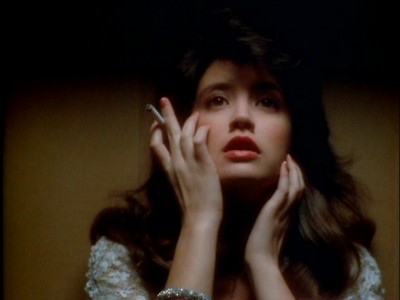
I wish I could describe every single ridiculous scene. "International sex symbol" Lili (snarling, pouty, perfectly-formed Phoebe Cates), is looking for her mother, Lucinda Lace. Abandoned by her birth mother, raised by peasants close to the Iron Curtain, and then later forced into Soviet labor camps, Lili has clawed her way across more beds than Zsa Zsa Gabor to reach the pinnacle of fame, and now it's time for some payback, Mommy! But blowsy Aunt Hortense Boutin (Angela Lansbury), who regularly funneled money from "Lucinda" to Lili's cheerful-but-badly-dressed adoptive parents, tells Lili that "Lucinda Lace" was just a fabrication, a fictional construct by someone who attended the prestigious L'Hirondelle boarding school in the Swiss Alps. Cue the wavy lines as the extensive flashbacks begin. 1960. L'Hirondelle, run with fascist strictness by Monsieur Chardin (Herbert Lom), fails to impress inseparable threesome "Pagan" Trelowney (Brooke Adams), Judy Hale (Bess Armstrong) and Maxine Pascal (Arielle Dombasle). Whether it's smoking in their room at night, or popping their cherries with the first man they can snag, these three hellcats aren't going to let little things like European breeding and culture hinder their fevered efforts in ruining their self-esteem.
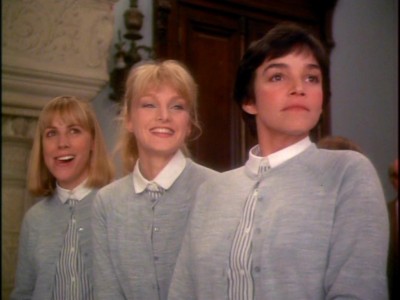
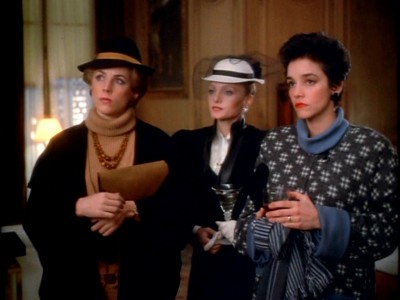
And a good time is indeed had by all. Blonde, sultry Maxine scores a hat trick with ice hockey player Pierre Boursal (François Guétary - he shoots, he scores!); level-headed, wholesome Kansan Judy naturally puts security before love and gives it up to American banker (no penalty for early withdrawal), Nick Cliffe (Simon Chandler); and Pagan (oh, that name) wins the "Harlequin Romance Novels' Cheap Whore-Steps-Up-in-Class Award" for bagging that most prized of romanticized hymen-breakers, the Oxford-educated Middle-Eastern sultan: dreamy, heavily-eyelinered Prince Abdullah of Sydon (Anthony Higgins). With that top-shelf donor pool, somebody had to get knocked up, right?, and sure enough, a baby is on the way. But which of these three unmarrieds has made their parents so proud? I'm not gonna tell, and neither does Lace until the very last scene, but in the meantime, we get to see the girls blackmail their way out of school, fob off the child for Soviet-bloc adoption (only grainy black-and-white snapshots for the half-interested trio of mothers are available), while making a pact for one of them to get the kid back as soon as a successful career is achieved (riiiiiiiiight). Relieved when they hear that the pesky child has died in a car accident (phew!), they continue on with their selfish pursuits. Used-goods Pagan, after running the hell out of her mother's hotel when "new friend" (read: lesbian) Selma (Honor Blackman) lays a wet one on her, and after failing to seal the deal with not-so-dumb Abdullah, marries boring cancer researcher Sir Christopher Swann (Nickolas Grace). Real estate agent Maxine returns to France, pops Count Charles de Chazalle's cork (Leigh Lawson), and turns into a winery Countess. And journalist Judy goes to New York to begin a bloodless affair with fellow journalist/could be gay Tom Schwartz (Trevor Eve), before hitting the bush in 'Nam, writing a book about her war experience - Rape in a Foxhole (I'm not making it up) - which naturally leads to starting up hard-hitting fashion magazine, Lace. Fully established in their careers and smugly unconcerned with their past indiscretions, the trio have no idea what kind of emotional hell they've unleashed when Lili gathers them together and asks, "Incidentally...which one of you bitches is my mother?" (I just had to type that again).
MAJOR SPOILERS ALERT!
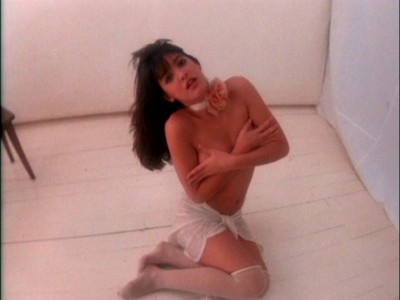
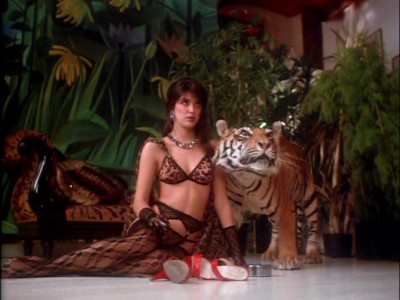
Listen, I'm not going to go crazy for paragraphs and try and convince anyone that Lace is some kind of misunderstood masterpiece. It isn't. It's excrement. But I do maintain that it's one of the finest examples of this kind of junk you can find, and it does have a perverse elegance to the way it presents itself with a completely straight face. Had the makers of Lace deliberately tried for "camp," it would have failed like most of those wretched, high-gloss, big-budget minis that the networks used to score with in the 80s. Instead, this garbage is put over with a cool, imperturbable steadiness that I found simultaneously fascinating and hilarious. 1984 was the absolute zenith in terms of American television viewers' fascination with the high-gloss emotional tribulations of the rich (with a simultaneous Eurotrash envy that never seems to die, unfortunately). Dynasty and Dallas were the number one and two television series in the country, and super-sudsy trash-minis like Lace, with their 80s "return to romance" patina spread over an escalating network willingness to exploit once-forbidden sexual situations, were snagging big Nielsen numbers. Unless you were watching TV around that time, it's impossible now to understand how...daring and deliciously naughty it was in 1984 to hear a character utter that infamous "bitch" line in a prime-time drama, a moment now ridiculously tame, but one which would have been unthinkable just a few short years prior to Lace's debut.
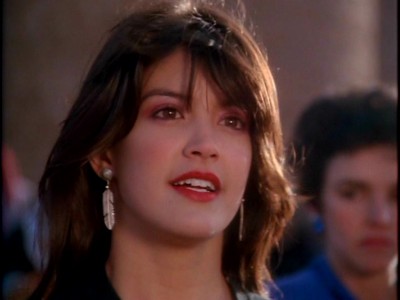
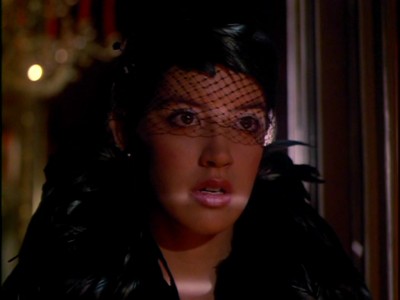
Watching Lace now, it seems positively quaint compared to today's network drama offerings (no nudity, no simulated sex scenes, no swearing other than that solitary "bitch," no overt perversity). Adding to that bemused tone is the cornucopia of melodramatic clichés and iconography that Lace mines so well. Every single character and situation, geared for maximum romance novel effect, is remarkably consistent within this aesthetic.. From the framing devices such as Judy's romanticized novel about Lucinda Lace, which is just a thinly disguised biography of the trio's emotional and erotic adventures, to Lili's desperate personal journey, from abandoned child, to witness of her adoptive parents' death, work camp slave, porn actress and finally world-famous sex symbol and avenging angel (I'm surprised no one worked in a chase over the ice flows), Lace eschews any attempt at realistic drama and shoots straight ahead with melodrama, and doesn't look back. Peppered throughout this rigidly adhered-to viewpoint are romance novel/melodrama symbol after symbol - from Abdullah, complete with white charger, rescuing the girls in a runaway cart, to his assertion that he had specifically-designed sexual training to please a woman, to his desert oasis and tent right out of a Valentino movie - that reinforce the aesthetic with metronome regularity and precision.
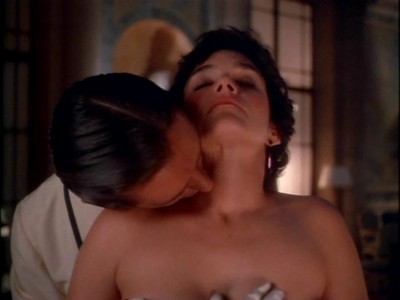
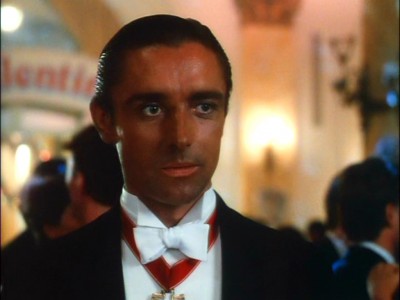
Add to this the visual lushness of the film (some serious 1984 TV money must have been spent on this to achieve the spectacular backdrops and expensive-looking production design), as well as the deliciously over-the-top moments and lines (Maxine spitting in Lili's face and calling her a "filthy slut," is good, but Lili's dejected, "Who wants a porno queen for a daughter?" rivals Lace's more infamous "bitch" line), and Lace becomes a seminal moment in network TV's re-introduction of melodrama filtered through the "New Trash" sensibility that was inevitable with the maturing of the medium. Context and melodramatic semiology top everything in Lace; it doesn't matter that throughout the flashbacks, Adams, Armstrong and Dombasle aren't believable as school girls, nor particularly interesting as selfish, career-oriented women. However, Cates' turn as the pouty-mouthed, perfectly ripe, vengeful Lili, manages to match the intensity of the melodramatic context and the feminine-soaked mise-en-scene. It's really a rather remarkable performance, considering the vehicle, with Cates alternately petulant and fiery and wounded, all the while walking a fine line between her over-the-top theatrics and surprisingly subtle comedy - a turn perfectly in synch with the material.
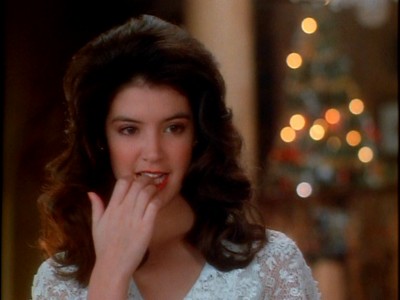
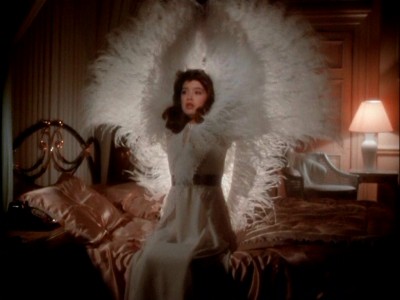
The DVD:
The Video:
Considering the age of the original materials (or at least the sourced materials used for this full-screen, 1.33:1 transfer), Lace looked fairly close to how I remember it back in '84. That hazy, gauzy look of many minis from that period seems to transfer over, while the colors (a little bit faded), are mostly correct. A medium-sharp image helps. Edge enhancement is minimal.
The Audio:
The Dolby Digital English mono accurately reflects how most people probably heard this mini over their tiny TV speakers back in '84. The recording level at times seemed a tad low (as it does with many of these Archive Collection burns, but all dialogue was heard well enough. No close-captions or subtitles, as per Archive Collection standards, are available.
The Extras:
No extras for this Warner Bros. Archive Collection release.
Final Thoughts:
Remarkably consistent in its exploitation of romance novel and melodramatic conventions, with a bravura performance by Phoebe Cates as sullen, slutty, vengeful Lili, looking to payback the mystery mother who abandoned her. Unmitigated junk, but delicious nonetheless, and probably the best example of those glossy, trashy 80s miniseries. I highly, highly recommend Lace.
Paul Mavis is an internationally published film and television historian, a member of the Online Film Critics Society, and the author of The Espionage Filmography.


|
| Popular Reviews |
| Sponsored Links |
|
|
| Sponsored Links |
|
|
| Release List | Reviews | Shop | Newsletter | Forum | DVD Giveaways | Blu-Ray | Advertise |
|
Copyright 2024 DVDTalk.com All Rights Reserved. Legal Info, Privacy Policy, Terms of Use,
Manage Preferences,
Your Privacy Choices | |||||||









